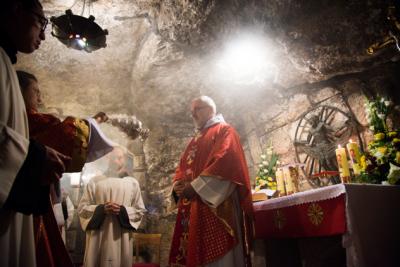Three days after Christmas, the Catholic Church celebrates the solemnity of the Holy Innocents, a recurrence that at first may appear to be in contrast with the joy of Jesus’ birth. Yet it is not: Fr. Dobromir Jasztal, the Custodial Vicar, spoke about it in these terms during the mass celebrated precisely where tradition places the tomb of the Holy Innocents. It is located in one of the small grottos below the Church of St. Catherine at the Nativity in Bethlehem and there, in the chapel of St. Joseph, a mass is held every December 28 for the solemnity of the Holy Innocents. This year, some Franciscan friars of the Custody led the liturgy. Also present were some nuns, local faithful and pilgrims.
The solemnity commemorates the children that Herod killed after the birth of Jesus, for fear of being dethroned. During the slaughter of all male children under two years old, as reported by the Gospel of Matthew, St. Joseph was warned in a dream to escape to Egypt with Jesus and Mary, and the place where the dream took place was exactly where the liturgy was celebrated.
“The feasts after Christmas do not take away from the joy of Christmas, but they make us understand its meaning,” said Fr. Dobromir in his homily. The Vicar spoke about all of the questions that we could ask on this occasion: Why does God save Jesus but not all the children of Bethlehem? Would God have committed such injustice? Why are the children considered martyrs, even if they did not have any choice? “The reason for this apparent inconsistency on God’s part can only be understood through the event of Jesus’ Incarnation,” said Fr. Dobromir.
An important step that everyone must then take is to get out of human logic. “On the cross, Jesus showed us that he does not destroy his adversaries, but that he is the winner. And not as we would have expected.” God gives his own value to innocent death, as he has given value to the death of Jesus,” explained Fr. Dobromir. “Are we able to believe in this logic? If so, we will not have any difficulty in considering the Innocents as holy martyrs that we celebrate with this liturgy.”
By: Beatrice Guarrera
Source: custodia.org






